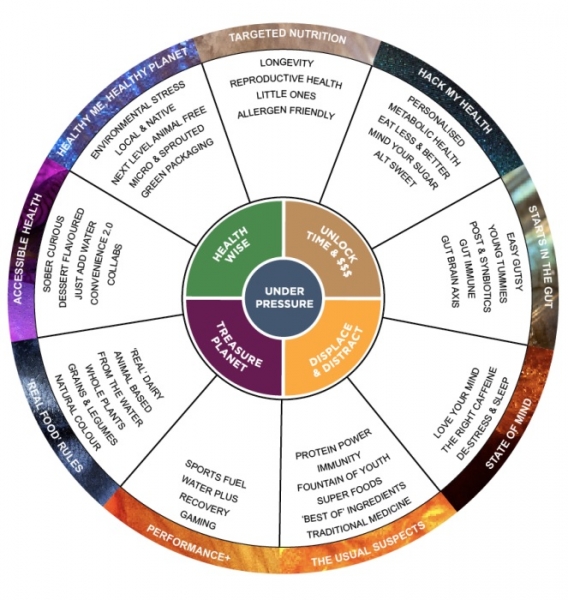Fresh into 2024, the company released its Functional Health Trends report, which covers retail, foodservice and social media. By analyzing patterns in retail and food service and engaging in social media listening, analysts combed the data to identify megatrends and subtrends that could shape the industry this year and beyond.
Prinova also explored the role that branded ingredients with science-backed benefits play in boosting consumer confidence in product efficacy.
“This is also important in a time when savvy consumers are increasingly researching the claims of foods and beverages for themselves,” noted James Street, Prinova’s marketing director for the EMEA & APAC regions.
Megatrends
The nine themes or megatrends covered by the report include: “Targeted Nutrition”, “Hack my Health”, “Starts in the Gut”, “State of Mind”, “The Usual Suspects”, “Performance+”, “Real Food Rules”, “Accessible Health” and “Healthy Me, Healthy Planet”.

Digging deeper into some of the megatrends, the report described the desire for real, unprocessed food (“Real Food Rules”) and a growing interest in the way products interact with genotypes, phenotypes and lifestyles (“Hack my Health”), as well as the demand for products with detailed claims (“Targeted Nutrition”).
“Emerging research and increasing consumer awareness of how products interact with genotypes and phenotypes are driving demand for personalized nutrition, closing the door on the traditional ‘one-size-fits-all’ approach,” Street explained. “The trend is not simply powered by health and longevity needs, however – it’s as much about catering to consumers’ cultural and lifestyle preferences, and tastes. In this space, we see choice and personalization ripe to be enhanced by companies investing in technology such as apps and AI-generated, individualized meal plans.”
Subtrends
Within the targeted nutrition megatrend, the analysts identified female reproductive health as an important subtrend.
“We’ve recently seen a surge in advice and products aiming to support periods, pregnancy and menopause, in particular, and an uptick in claims targeting specific symptoms such as PMS and polycystic ovary syndrome (PCOS),” Street explained. “This is manifested in formats that are especially appealing to women, including chocolate, gummies, supplements and fortified beverages.”
Another subtrend is natural or “clean” sources of caffeine as opposed to the synthetic caffeine that has been more prevalent in the market.
“Natural caffeine emerged as a trend that will be entering the mainstream in 2024,” Street said. “Caffeine is one of the most consumed psychoactive ingredients around the world, but consumers are increasingly keen to find sources that provide a jitter-free ride with no crash. ‘Clean’ caffeine is seen as a solution for steady and enduring energy, and it features frequently in products with ‘focus’ claims. We offer natural sources of caffeine, including green tea, matcha and green coffee extract, as well as guarana (Paullinia cupana). This is a plant native to the Amazon Basin whose seeds contain around four times more caffeine than coffee but with a high tannin content that results in the caffeine being released slowly, avoiding a spike and sudden crash.”
Acknowledging that gender, generation and age play a role in these megatrends, Street said consumers are becoming more knowledgeable and aware of how different life stages bring their own specific requirements for optimal health, with “healthspan” becoming more commonly used than “lifespan” as a measurement of vitality.
“They also recognize that preparing for longevity starts early, with an increasing number of longevity products targeted at both younger and older age groups,” he added. “For example, products targeting microbial diversity in support of the ‘Starts in the Gut’ trend are being reformulated for children as well as being offered to the more traditional adult market.”
As consumers seek out various nutritional products to meet a growing number of needs, Prinova said its latest report maps out where opportunities lie so customers can create innovative products.
“We’ve created a future-facing framework that identifies the most important emerging trends,” Street said. “We’ve seen how consumers are looking for nutritional ‘hacks’ in areas like cognitive performance and emotional wellbeing, while also yearning for a return to products with ‘real food’ or ‘natural’ credentials.”
